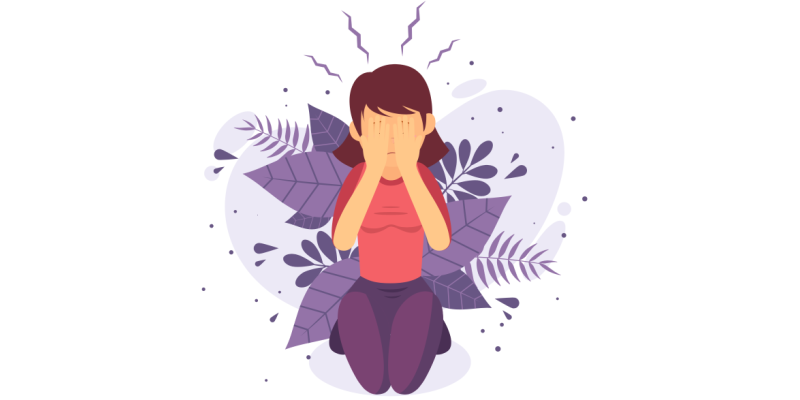By Shelby Rowe Moyer
The term “anxiety” is a major player in our social and emotional lexicon. And for good reason. According to the Anxiety & Depression Association of America, it’s considered one of the most common mental illnesses in the U.S., affecting 40 million adults.
Psychotherapist Leslie Golden, APSW, of Madison-based Westside Psychotherapy, says anxiety is best described as a “constellation of experiences and feelings and manifestations.” It can present itself as a churning in your chest, racing thoughts, a desire to achieve perfection and control. It can cause headaches, tension in the body and stomach problems. Most people verbalize anxiety as a feeling, but Golden says it’s probably more accurately described as a symptom of other underlying feelings, like fear and/or anger.
Anxiety can sprout from a long list of life events, but Golden says a few common themes include social acceptance and approval. Another common theme is combating stresses brought on by work and a society that “praises and worships productivity,” Golden says.
So, when does generalized anxiety become a clinical diagnosis?
In short: “Once it’s disrupting your life. If you can’t meet the demands of your life; if you’re meeting them with distress; if it’s severely impacting your diet, your sleep, your functionality,” Golden says.
These anxiety-based reactions can completely change how a person sees and experiences the world around them. “[Often], you’re seeing ‘no’s where there are ‘yes’s. You’re seeing hurdles where there are small bumps. You’re experiencing your environment as being at odds with you — as something that you have to constantly overcome and that requires a great deal of resilience that maybe you don’t feel like you have.”
WHAT CAN HELP
Avoiding anxiety altogether is likely impossible, but there are many things a person can do to help regulate themself. Seeking therapy, medication, practicing mindfulness and exercise are a couple of ways. Another strategy that might not come immediately to mind — but can be helpful for anxiety — is utilizing strategies for time management and organization.
Miranda Wise, owner of Wisely Organized, says many of her clients are anxiety prone, which is one reason why she decided to become a certified trauma-informed life coach. She wanted to get to the root of why people struggle with things like procrastination, time prioritization and organization. Anxious people can sometimes fall into two camps: People who are highly distracted and pinging around from task to task; and people who want so much control that they have trouble dealing with the unexpected.
For the anxious person who feels easily distracted, she recommends joining the “no notifications club.” If you can, turn off email notifications.
She also recommends having end of day and/or beginning of day rituals. For example, begin or end the day by cleaning your work space and creating a list of three to five priorities. Wise says the goal of having these rituals is to start and prevent that anxiety-inducing feeling of never-ending work.”
For people that need to become more flexible, having a small list of priorities can be helpful. Address priorities at the beginning of your day, so you tackle other unexpected tasks as they arise. That way, you’ll end your day feeling ahead — or at least on track — instead of behind, she says.
“It’s all about the feeling,” Wise says. “You need to feel good in order to get things done, and getting things done leads to good feelings. That’s the ball. You’ve got to keep it rolling.”
Ask yourself what feels good. For some, it’s doing the most important thing first. For others, it’s accomplishing small tasks. Or stepping away during the day to take a break.
It’s also important to create boundaries and understand how much time you actually have during the day, Wise says. If you know exactly where your time goes and how you want to spend it, then you can start deciding what’s really important and what you may need to say “no” to.
WHY DO THESE TACTICS HELP WITH ANXIETY?
“Well, when you realize that all these things don’t matter as much as you say they did, and that you can say ‘no’ to some of them, then you’ve got less things, and that’s part of task anxiety,” Wise says.
You should also ask yourself why something makes you anxious, Wise says. Your body is trying to tell you something, and it could be a sign of your true underlying feelings — like fear of failure or that you’re on the wrong path.
For those that know someone with anxiety, Golden recommends listening to them, being patient and compassionate.
“Allow people to feel their feelings rather than tell them not to,” she says. “Let it out. Be angry. Be sad. Be whatever you need to be. If it’s disrupting your ability to function in your life, seek help.”
OTHER RESOURCES
THE APPS
UW-Madison’s Center for Healthy Minds has an app called Healthy Minds Program that can help you strengthen your emotional awareness and intelligence. Free for Apple and Android devices.
MyLife is an approachable app for busy people who want to try meditation and mindfulness exercises. Guided sessions take as little time as three minutes, with options for longer timeframes. What’s unique is that you can “check in” throughout the day on the app, tapping on emotions that you’re feeling at the moment. With those results, the app will offer you meditation and breathing exercise options on varying themes and time lengths that can help quell overwhelming emotions or calm your mind. Free for Apple and Android devices. (Paid, upgraded subscription options also available.)
THE PODCAST
“You’re Welcome with Hilary Rushford” runs the gamut of self-care topics, including emotional wellness. Rushford also has a goals journal called Elegant Excellence.
THE BOOK
“Don’t Feed the Monkey Mind: How to Stop the Cycle of Anxiety, Fear, and Worry” by Jennifer Shannon uses a cognitive behavior therapy approach to help you catch anxious thoughts as they’re happening, accept them and confront them.




